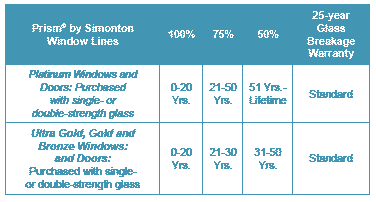It’s easy for folks to hear salesperson after salesperson say their windows have a “lifetime” warranty. You can get used to hearing it and you might start to think that they’re all the same.
On the other hand, companies that offer more limited warranties will try to explain why a shorter warranty is better. They’ll say that a lifetime warranty is actually only good for a few years (which is not true and they probably know it). Why would they do this? Because nobody would buy their products if they couldn’t explain why the warranty was so short. Renewal by Andersen is a great example of this one.

This is a 2 year warranty on installation, 10 years on the oh so fancy Fibrex frames. That is a REALLY short warranty.
Update: Renewal by Andersen has since updated their warranty and it’s now 20 years on the frames. Perhaps they took our advice! It’s still shorter than what you’d get from a lot of other companies, but 20 years is a pretty long time.
We also hear from customers that they don’t want to depend on a warranty so they want to pick a quality product that they think will hold up. Of course picking a quality product is a great strategy, but in discounting the warranty they’re ignoring a crucial data point indicating the quality and anticipated lifespan of the product.
Here’s the deal. Brochures and flyers are written by salespeople. Warranties are written by lawyers and engineers. There’s a big difference.
The warranty on any window or door product is a direct indication of how long the manufacturer actually expects the product to hold up. If they offer a long and comprehensive warranty they’re telling you they are confident that the windows will last. If they offer a shorter or more limited warranty they are directly saying that they think the product may fail after that point.
Think about it this way: a shorter warranty will absolutely result in fewer sales. The manufacturer knows that some percentage of their potential customers will thoroughly read the warranty and if it isn’t as good as their competitor the customer will buy elsewhere. Why then would one company offer a warranty that is more limited than their competitor? Remember, they know doing this will result in lower sales. They do it because they have to. They do it because they know that some percentage of their products will fail after those limitations run out and they don’t want to be on the hook for the repairs.
So what are the differences between different window warranties?
You’ve probably seen that most decent replacement windows offer some type of “lifetime” warranty. That’s absolutely true, but as with most things, the difference is in the details. When it comes to warranties the differences can be huge.
Here are 5 common differences:
Labor coverage – You’ll see a lot of “lifetime” warranties, but when you actually read them the labor is only covered for a limited period.
There are also 2 types of labor to consider. There is the labor of the installer who did the initial work, and then there’s the labor of the service technician who comes out to replace a defective part. Are they both covered? Is one limited to 1 year or even completely excluded? They may be. If the service labor is limited who is going to repair a broken window or replace a damaged balance? How much will it cost?
Remember the Renewal by Andersen example above. 2 years of warranty on installation. Many companies cover these items for as long as you own the home. That’s a BIG difference.
Glass breakage coverage – Do you know how much it can cost to replace an insulated glass unit? Remember, these aren’t the old single pane windows you might have had growing up. A new sealed glass unit can easily run $100 – $200 for a typical replacement window and the labor can double the total cost. We recently got a quote to repair a broken window from a local competitor to make sure we knew what the competition was charging. It was over $400 for one piece of glass in a typical double pane window. That’s real money.
Here is a clip from the Simonton Prism window warranty. You can see the insulated glass warranty is prorated overtime, but the glass breakage warranty is solid for 25 years.

Some companies offer a glass breakage warranty to everyone they do business with. Some offer it at an additional cost and others don’t offer it at all. When you’re considering a window project it’s important to know what you’re getting.
When you hear that baseball go through the window you’ll be glad you know what you picked!
Hardware & moving parts – As you get a few quotes and look at window samples you’ll quickly see that there are hundreds of choices and they all use slightly different bits and pieces. That’s not a problem, except when you need a new lock 10 years down the road. How will you get one that matches the rest of the windows in your home?
Some companies cover the hardware, balances and all moving parts for as long as you own the home and some limit that coverage to just a few years. This is an important distinction.
Screen coverage – We frequently see warranties that exclude screens. Screens aren’t expensive, but the frames tend to be proprietary so you may have trouble getting a replacement down the road.
Screens are really easy to fix or replace so any company interested in taking care of their customers after the sale will have no problem covering screens. A company that excludes screens is telling you that they don’t want to hear from you once your check clears.
Coastal coverage – This one can be important. We recently read a window warranty from Ideal Windows that defined coastal as being within 1 mile of any tidal body of water. Right now I’m easily a 2 hour drive from the beach, but I’m less than a mile from a tidal river. I grew up in Chicago, less than a mile from Lake Michigan, which has tides. Both of these locations would be considered coastal under that definition and as a result the warranty would be extremely limited.

I can guarantee you my family in Chicago doesn’t consider their home to be near the coast. Someone in that position might skip right over a section on coastal coverage and they would be out of luck if they have a problem down the road. Maybe I like reading these because I have several lawyers in my family, but the devil is in the details.
As you can see from these basic examples (we could go on all day) there are HUGE differences in the warranties of replacement windows. We know it is REALLY dull to read the fine print of a window warranty. It only takes a few minutes and we can guarantee you it will be time well spent.
If you remember any one thing remember that a more limited warranty results in lower sales. Why would a company offer a warranty that results in lower sales? Because they have to. Because they know their products won’t stand the test of time.
This is a HUGE data point and you’ll be remiss to overlook it.
Have a question about a specific window warranty? Post it here and we’ll dig into the details. We really do love this stuff.



